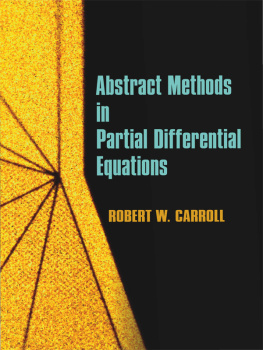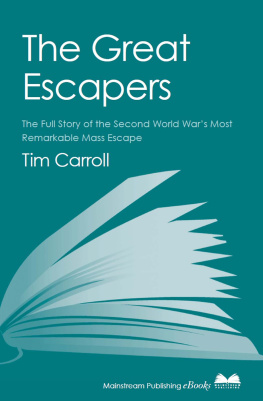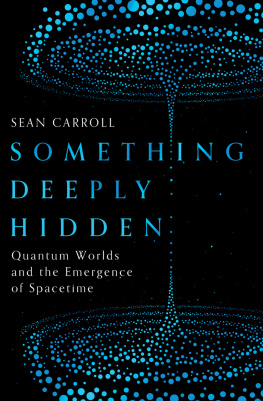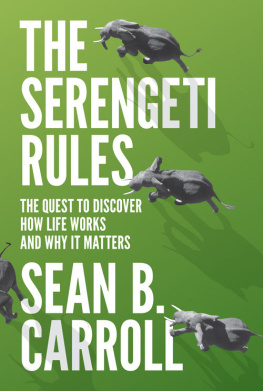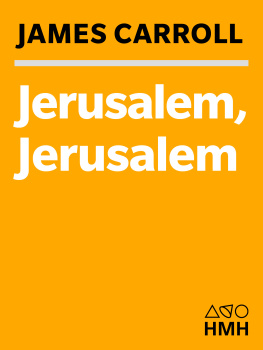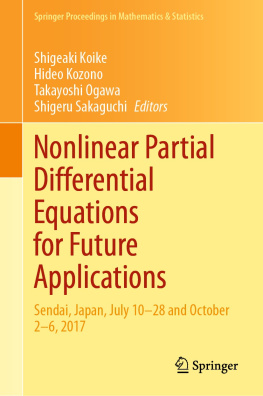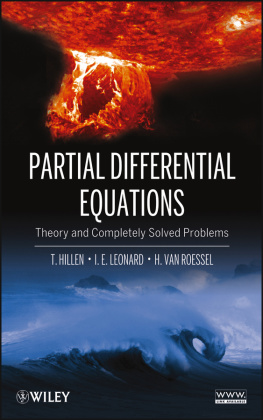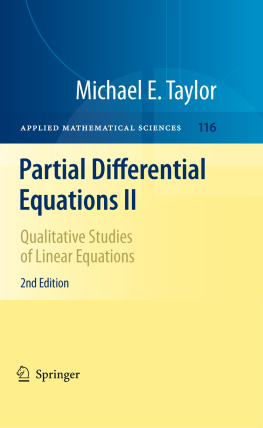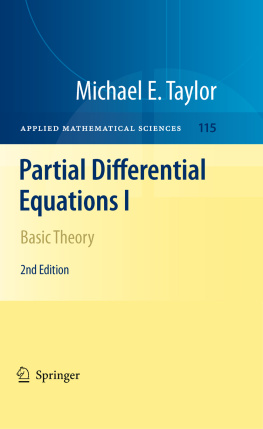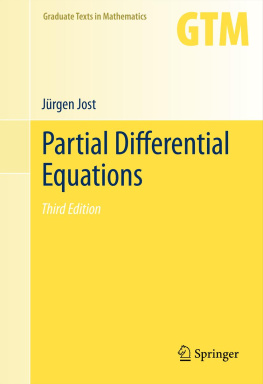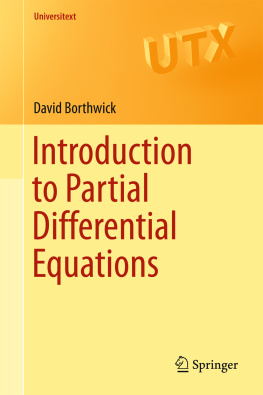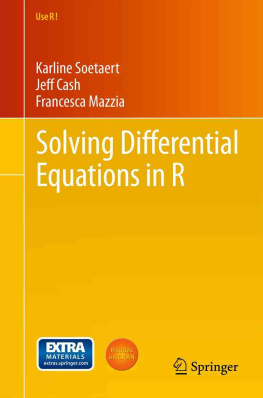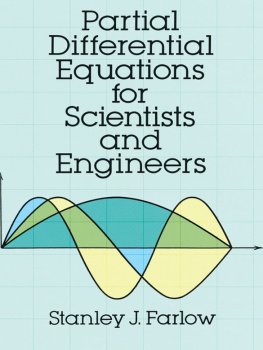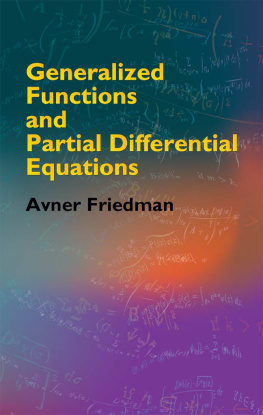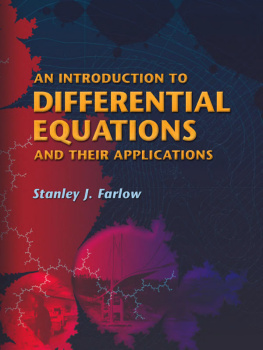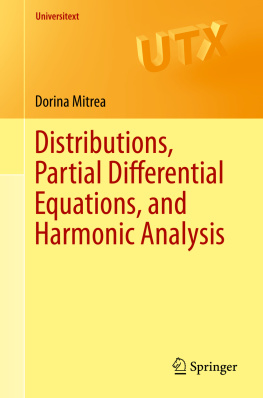Copyright
Copyright 1969, 1997 by Robert W. Carroll
All rights reserved.
Bibliographical Note
This Dover edition, first published in 2012, is an unabridged, corrected republication of the work originally published in 1969 by Harper & Row Publishers, New York.
Library of Congress Cataloging-in-Publication Data
Carroll, Robert W.
Abstract methods in partial differential equations / Robert W. Carroll. Dover ed.
p. cm.
Originally published: New York : Harper & Row, 1969.
Includes bibliographical references and index.
ISBN-13: 978-0-486-48835-6
ISBN-10: 0-486-48835-7
1. Differential equations, Partial. I. Title.
QA377.C33 2012
515'.353dc23
2011051005
Manufactured in the United States by Courier Corporation
48835701
www.doverpublications.com

CONTENTS

In giving courses in partial differential equations (PDE) for the last eight or nine years, I have frequently felt the need for a book which would allow a student to become familiar quickly with various abstract points of view in PDE, so that he could read the literature and begin thesis work. Hence, this book was written from lecture notes which were devised and used for that purpose.
This is not intended as a first book in PDE, but rather is intended to make certain useful abstract methods completely accessible to students and scientists who may have had some contact with classical PDE. Therefore, I do not spend a great deal of time on motivation but formulate and solve various generalized problems directly. For example, many graduate students in mathematics who are seriously interested in PDE have already been exposed to the use of PDE in physics or engineering, however, they lack the broad foundation in abstract mathematical analysis which would permit them to take their first modern course in PDE in preparation for thesis work. Similarly, scientists wishing to read modern papers on PDE may benefit from a concise and rigorous presentation of the necessary mathematical background material. One of the aims of this book is to provide a detailed presentation of various abstract methods in PDE without requiring prior knowledge of many mathematical subjects and simultaneously to illustrate the applicability of these methods to the solution of interesting differential problems. This is accomplished by selecting, and treating rigorously, only what is needed from various mathematical disciplines, starting from zero. The pace may appear somewhat fast at times, but it must be emphasized that everything is fully defined and, with minor exceptions, everything is proved.
The book is not intended to be a survey of PDE in the modern world, nor do I always try to give the best technical theorems known. For example, I have almost entirely omitted the general theory of differential since I am in the process of writing a second book developing certain global aspects of global analysis for analysts.
When the word (exercise) appears in the text it indicates that the exercise is quite easy and that I simply did not want to use space for the details. The numbered exercises are somewhat harder and are designed to round out the text discussion. Some concrete examples are used in the text itself in order to motivate and illuminate the abstract frameworks as they are developed.
Many references to the literature have been included, but the list is far from complete. The selection was governed primarily by the topics discussed and, in the case of abstract evolution equations, an attempt was made to list most of the relevant recent papers. Some time has elapsed since the manuscript was completed, and the references have been brought up to date in certain respects. There are many points of view and much activity in the field, so I have tried to reflect this while compiling a useful guide to the recent literature.
The National Science Foundation supported some of the research results in this book under grants GP-1448, GP-4575, and GP-7374. I would also like to acknowledge the contributions of numerous people at various times in my education or welfare. A particular debt of gratitude and love is due to my parents, Dorothy and Walter Carroll, my aunt, Amelia LeMonnier, my wife, Berenice A. Carroll, and my wifes family, in particular, Morris and Margaret Jacobs. I would especially like to thank my wife for her support over the years. My mathematical formation has been enriched by contact with many people too numerous to name; a particular debt for support at various times is due to P. Bateman, F. Browder, K. T. Chen, J. Horvath, J. L. Lions, L. Rubel, A. Weinstein, and K. Wolfson. I would also like to acknowledge the work of Mrs. Patricia McStay, who typed the manuscript.
ROBERT W. CARROLL
This book is dedicated to my son,
DAVID CARROLL
This chapter consists mainly of a concise introduction to the theory of distributions following L. Schwartz. The subject is viewed as a topic in the theory of locally convex topological vector spaces (LCS) and is used simultaneously as a model and vehicle to develop some locally convex theory very rapidly. The remainder of the book will not require much more about distributions than a good understanding of what they are; however, there are several reasons beyond that for dealing with the subject somewhat more thoroughly here despite a number of excellent recent textbook-style expositions (see references below). First, much of the functional analysis will be needed later as well as, for example, the notion of tensor product. Second, distributions are an essential ingredient for modern work in partial differential equations, and we feel it is appropriate and necessary to discuss them seriously in a book about abstract methods in PDE. In addition, distributions represent much more that a technical device to solve PDE and we would like to illustrate and emphasize to the uninitiated some of the beauty of the subject as a topic in functional analysis. The basic reference is [S 1], and we cite also [Fr 1; Ge 1, 2; H 1; Gx 1; Ho 1; Tr 3; Ncb 1; Seb 1, 2]. For general topology see [Ke 1] or [B 1], and for topological vector spaces see, for example, [B 2, 3; Ko 1; G 1; Tr 4], and the references on distributions above. We will not treat extensions of distributions related to boundary values of analytic functions (such as ultradistributions, hyperfunctions, etc.) but refer for this to [Seb 3, 4, 5; Tm 1, 2; Sat 1; Bgl 1; Ko 2; Ru 1, 2; Mt 1, 2; Eh 3; Har 1; Ks 4]. Similarly, we will not discuss Mikusinski operators (see, e.g., [Mki 1]).
The theory of differential operators can be developed in terms of unbounded (not continuous) operators in Hilbert and Banach spaces and simultaneously in terms of continuous operators in somewhat more exotic spaces. These points of view are not really distinct, of course, and we should like to emphasize the interaction between them rather than treat them as separate doctrines. In fact, we shall work primarily in Hilbert spaces in much of this book but distribution techniques will frequently intervene.
Roughly speaking, distribution theory, or the theory of generalized functions, is all about differentiation. One constructs a space 

